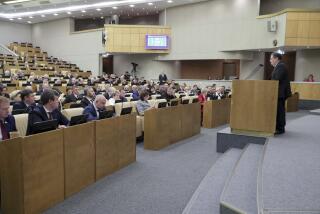Soviets Plan Radical Move to Save Economy
- Share via
MOSCOW — President Mikhail S. Gorbachev’s advisers decided today to introduce radical reforms next year to try to salvage an economy plagued by massive shortages, strikes and ethnic conflicts.
Food prices would double, but the government would continue to regulate the cost of staple items, a draft of the planned reforms says. The reforms would not start until next year and would take place over five years, instead of the two years discussed earlier.
Foreign Ministry spokesman Gennady I. Gerasimov told a news briefing that the Presidential Council approved the draft report today and that Premier Nikolai I. Ryzhkov will present it to the Supreme Soviet Parliament on Thursday. Gerasimov did not say whether the council had made any changes in the 70-page plan, obtained by the Associated Press.
The plan falls short of the free-market measures in Poland that led to a spurt of rapid inflation over the last six months.
Soviet officials fear that sudden rises in food prices could touch off riots and strikes, such as those that toppled Polish Communist governments in the 1970s and 1980s.
Nevertheless, the plan is far more radical than the government program presented in December to the Soviet Congress, the Supreme Soviet’s parent Parliament.
That plan essentially proposed three more years of a centrally planned economy, but sentiment is growing that faster steps are needed to improve production and distribution.
“The negative effect of political instability, strikes and inter-ethnic conflicts is growing ever stronger,” Ryzhkov’s report says. It appeals to all workers not to strike.
Ryzhkov’s draft came under immediate fire from a parliamentary opposition group that plans to present an alternative economic blueprint advocating a market economy.
The government report emphasizes the need to control inflation, unemployment and other social ills, but also outlines major price increases and other reforms beginning in 1991.
“The retail prices on food should, on the average, double, increasing by 112 billion rubles ($187 million),” the report says.
However, the prices of basic foodstuffs--including bread, meat and oil--will remain under government regulation and not be allowed to spiral out of control, the plan says.
It also provides for wage indexing to cushion the effect on the country’s poor.
More to Read
Sign up for Essential California
The most important California stories and recommendations in your inbox every morning.
You may occasionally receive promotional content from the Los Angeles Times.













